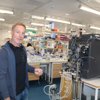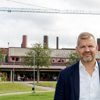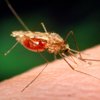Fritextsökning
Artiklar per år
Innehållstyper
-

The art of building a biologic drug
The first biosimilar from Xbrane Biopharma was launched earlier this year, and several more are under development at the company’s facility in Solna, Sweden. “We do everything in-house ‒ from DNA fragments to a final process,” says David Vikström, Chief Technology Officer at the company.
-

Founder of Bioarctic, Lars Lannfelt, is honoured: “I want to create something for the future”
It´s like a scientist’s dream: to be the world’s first with a drug that genuinely affects one of our major diseases. Lars Lannfelt and his company Bioarctic have achieved just that, and they are thus making a significant contribution to the history of Swedish medicine. He is now being awarded the Research!Sweden Award 2023.
-

Positiva röster om nya förslagen kring forskningsfinansiering
I onsdags lades en ny utredning fram med förslag om att i grunden förändra dagens struktur för finansiering av forskning. Life Science Sweden har pratat med flera branschföreträdare som ser positivt på förslagen.
-

The first drugs to slow down Alzheimer’s – but what does it mean for patients?
New treatments for early Alzheimer’s are bringing hope to thousands of patients and their families. The question is, who will get the treatment, how will the right patients be found in time, and will the healthcare system’s resources be sufficient? Life Science Sweden has spoken to Swedish researchers in Alzheimer’s who voice cautious hope but also see further challenges.
-

Astra Zeneca’s Sweden CEO: “We have great faith in our portfolio”
It all started with a summer job as an operator at Astra’s chemical factory in Snäckviken, just outside Södertälje. More than three decades and countless different assignments later, Per Alfredsson, born and raised in Södertälje, is CEO of Astra Zeneca Sweden, which employs 7800 people in Södertälje, Stockholm and Gothenburg. “It was a very special feeling to be in charge of the entire organisation,” he says in an interview about his career and potential future blockbusters.
-

Astra Zenecas Sverige-vd: ”Vi tror superstarkt på vår portfölj”
Det började med sommarjobb som operatör på Astras kemifabrik i Snäckviken. Över tre decennier och otaliga olika uppdrag senare är Södertäljesonen Per Alfredsson vd för hela Astra Zeneca Sverige, som samlar 7 800 anställda i Södertälje, Stockholm och Göteborg. ”Det var en väldigt speciell känsla att bli chef över hela verksamheten”, säger han i en intervju där han berättar om sin karriär – och om kommande potentiella blockbusters.
-

Lundabolag tecknar nordiskt avtal och tar in ny finansiering
Lundbaserade Acucort har tecknat ett avtal med Unimedic om försäljning och marknadsföring av munfilmen Zeqmelit i Sverige, Danmark, Norge och Finland. Samtidigt aviserar bolaget en nyemission för att finansiera en kommersialisering av läkemedlet i USA och EU.
-

Life Science Sweden heads to the Oresund region! ‒ Hello there Michael Linnell
Life Science Sweden’s The Future of Swedish Danish Life Science and New Updates in Drug Formulation & Bioavailability meetings are coming up soon. We asked Michael Linnell, project manager for Life Science Sweden’s event portfolio, a few short questions.
-

Bioarctic granted Japanese patent for Parkinson’s disease candidate
Bioarctic has been granted a Japanese patent for its antibodies targeting Parkinson’s disease.
-

CROs in drug development: "We use our expertise to speed up the process
Consultancy firms have become an increasingly important part of drug development. “It’s a trend and a business model that works, and we see no indication that it will change,” says Helena Lüning of the industry organisation ASCRO.
-

Branschens doldisar – kontraktsforskarna
Konsultbolagen har blivit en allt viktigare del av läkemedelsutvecklingen. ”Det är en trend och affärsmodell som fungerar, och vi ser inga tecken på att den kommer att vika“, säger Helena Lüning, branschorganisationen ASCRO.
-

Why the world renown researcher Marc Tessier-Lavigne resigns as Stanford´s president
In mid-summer, neuroscientist Marc Tessier-Lavigne announced his resignation as President of Stanford following allegations of manipulated study data. According to the reporter Theo Baker, who first reported the story, Tessier-Lavigne “rewarded the winners and punished the losers”. Here is the background of the story which has shaken the American scientific community over the summer.
-

Stanfords rektor avgår efter anklagelser om forskningsfusk
Mitt i sommaren meddelade neuroforskaren Marc Tessier-Lavigne att han skulle lämna sin post som rektor för Stanford efter anklagelser om manipulerade studiedata. ”Han belönade vinnarna och straffade förlorarna”, säger reportern som avslöjade honom. Här är bakgrunden till vad som fick den uppburne forskaren på fall.
-

Anna Törner: The minute between life and death
“I have never told anyone about this day that happened more than 20 years ago. But I sometimes reflect on what happened, on what might have happened. When I try to understand why I haven’t told anyone, I find the answer: a feeling of shame. There is no forgiveness for something like this, even though it is very human to be distracted for a moment,” Anna Törner writes in a column.
-

Studie: Granatäpplen kan hjälpa till att rena vatten från läkemedel
Granatäpplen består inte endast av syrliga kärnor utan är även rik på antioxidanter, som ellagsyra. I en ny studie har forskare använt molekylen för att försöka få bukt med ett växande problem – läkemedelsrester i avloppsvatten.
-

Norwegian company wins bidding battle for Sensidose
The lengthy battle to acquire medical device company Sensidose is apparently over. Generic medicines company EQL Pharma is pulling out, selling its shares and leaving the way open for Norwegian company Navamedic.
-

Olika resultat för Sedanas inhalerade sedering av barn i studie: "Föranleder försiktighet i tolkningen"
En första analys av en fas III-studie med Sedana Medicals inhalationssedering påvisar "non-inferiority" – eller klinisk likvärdighet – för hela analyspopulationen, men inte i per protocol-analysen.
-

A new malaria vaccine offers hope but much more research is still needed
There has long been no vaccine against malaria, but there have been breakthroughs in recent years. However, it is still unclear how we become immune to the malaria parasite, and this is a vital piece of the puzzle for creating effective vaccines, says
-

Uncertainty about the government’s life science work
The government’s national coordinator for life science, Jenni Nordborg, left her position almost four months ago. No one has yet succeeded her, and now questions are being raised both about the government’s plans for the office and the Swedish life science strategy.
-

Frågetecken om regeringens life science-arbete
För snart fyra månader sedan lämnade regeringens nationella samordnare för life science Jenni Nordborg sitt uppdrag. Ännu har ingen efterträtt henne och nu väcks frågor både om hur regeringen ser på kontoret och på den svenska life science-strategin.
-

Swelife: Nu krävs gemensamma krafttag för svensk life science
DEBATT: Efter årsskiftet har life science-frågorna hamnat i skymundan för andra frågor på den politiska agendan. Det är viktigt att vi inte tappar den framdrift som hela sektorn fick med en nationell life science-samordnare, ett life science-kontor och en nationell life science-strategi. Handen på hjärtat, vem äger life science-frågan?
-

Column: ”Cheating with pea flowers and does it matter whether you are right?”
Is it possible to forgive shortcuts or outright cheating in science - if it turns out that the researcher was ultimately right? Anna Törner discuss this topic in a column.
-

Column: ”Life as a F1 race”
"The F1 car makes several pit stops during a race and during a lifetime the human being may also have to come in several times for maintenance", Björn Ursing writes in a column.
-

Editorial: ”AI that both impresses and frightens”
”In the past, I've rarely been particularly impressed by something that was produced by AI. But this is something completely different”, Samuel Lagercrantz writes in an editorial.